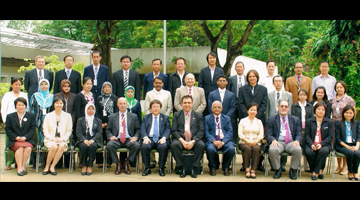 BANGKOK, Thailand ─ About 35 information and communication managers, including representatives from the Philippine Council for Agriculture, Aquatic and Natural Resources Research and Development or PCAARRD (this writer and Mr. Ricaredo V. Manzanilla), converged at the Asian Institute of Technology (AIT) for the Workshop on Information and Communications Management (ICM) for Agricultural Innovation in Southeast Asia.
BANGKOK, Thailand ─ About 35 information and communication managers, including representatives from the Philippine Council for Agriculture, Aquatic and Natural Resources Research and Development or PCAARRD (this writer and Mr. Ricaredo V. Manzanilla), converged at the Asian Institute of Technology (AIT) for the Workshop on Information and Communications Management (ICM) for Agricultural Innovation in Southeast Asia.
Held on September 27─29, the workshop aimed to discuss the role of information and communication management (ICM) in driving rapid agricultural innovation for market- and export-oriented agriculture in Southeast Asia.
Participants came from the National Agriculture Research Systems (NARS), Consultative Groups for International Agriculture Research (CGIAR) Centers, and other organizations in the Southeast Asian countries.
The countries of Southeast Asia are challenged to make agriculture and farming more market-oriented and integrated in their economies. In organizing the workshop, the Asia-Pacific Association of Agricultural Research Institutions (APAARI) recognized the potential of ICM to drive market orientation and integration in agriculture.
APAARI promotes the development of NARS in the Asia-Pacific by fostering use of information communications technology (ICT)/ICM in Agricultural Research for Development (AR4D) in the region. One of the main programs for this is the Asia-Pacific Agricultural Research Information System or APARIS. As part of the activities for bridging knowledge gap, APAARI organized a series of sub-regional workshops to improve partnerships among NARS. Specifically, these workshops aim to strengthen capacities and skills of personnel to promote greater sharing of knowledge for outscaling of agricultural innovations.
For this workshop, participants reviewed the status of ICM in their respective NARS and innovation systems. Also, they presented their ICM experiences that are contributing to agricultural innovation in their respective countries/regions. Then they identified the technological, institutional, and community participation related gaps in improving availability, access, applicability, and effective use of information for agricultural innovation. Speakers included this writer and representatives of Cambodia, Indonesia, Japan, Lao PDR, Malaysia, Myanmar, Thailand, and Vietnam.
The CGIAR Centers were represented by the International Rice Research Institute (IRRI), Center for International Forestry Research (CIFOR), and WorldFish. It is notable that IRRI and WorldFish were represented by Filipinos – Dr. Madonna Casimero and Dr. Len Garces, respectively.
In the second half of the workshop, APAARI partners pushed for greater involvement and participation in the Coherence in Information for Agricultural Research for Development (CIARD) movement. The CIARD movement works with more than 150 partners from across the world to make agricultural research information available and accessible to all. It is also working to enable the effective use of this information for agricultural innovation.
Speaking for the movement, Gerard Sylvester, Knowledge and Information Management Officer of the Food and Agriculture Organization Regional Office for Asia and the Pacific (FAO RAP) discussed the CIARD activities for data and information sharing in the region. Dr. Ajit Maru of the Global Forum on Agricultural Research (GFAR) furthered the discussion by explaining how the various NARS can participate in developing the CIARD Routemap to Information Nodes and Gateways or CIARD RING. Dr. Aree Thunkijjanukij then presented the value of the CIARD Ring to Kasetsart University and its knowledge management program.
The workshop ended with open discussions on ICM strategies for agricultural innovation, strengthening the regional agricultural information systems, and building on the CIARD framework. The participants then discussed how to apply the knowledge gained here in strengthening agricultural innovation systems at the national level and finalized the workshop recommendations.
In closing, Dr. Srinivasacharyulu Attaluri, APAARI secretary, thanked the heads of the various NARS and CGIAR centers for sending their representatives to the meeting. For his part, Dr. Simoun Hearn (chief advisor of ACIAR and chair of APARIS) reminded all that while there is great opportunity in ICT/ICM, these should go hand in hand with traditional methods. The challenge at hand is “communicating to farmers more effectively and convincing policy makers to support this work”.
In his concluding remarks, Dr. Raj Paroda (executive director, APAARI) said he was pleased with the gender balance at this meeting. “I am glad to see more women joining our workshop”. He also hoped that the balanced gender representation would continue in future meetings. In summing up, he stressed three main points: (1) The main aim is to serve the information and technology needs of resource poor and smallhold farmers to enhance productivity and to conserve and manage natural resources; (2) We must convince farmers to adopt technologies and train trainers as well as partners and on knowledge sharing; and (3) Keep the responsibility to sustain APAARI.
